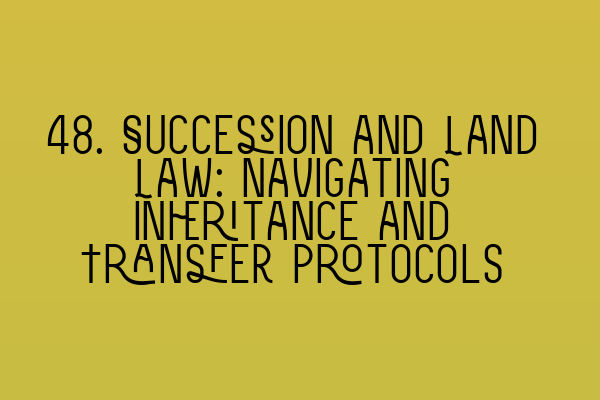48. Succession and Land Law: Navigating Inheritance and Transfer Protocols
When it comes to managing and transferring property and land ownership, there are several legal frameworks and protocols that need to be followed. One important aspect is understanding succession and land law, as it plays a vital role in ensuring a smooth transfer of ownership.
In this article, we will delve into the intricacies of succession and land law, providing you with valuable insights on how to navigate the inheritance and transfer protocols effectively.
Understanding Succession Law
Succession law primarily deals with the transfer of property and assets after a person’s death. It encompasses various legal principles and rules that determine who will inherit the property and in what proportion.
When it comes to succession, it is crucial to have a valid will in place. A will is a legal document that outlines a person’s wishes regarding the distribution of their assets and property after death. It ensures that their wishes are respected and carried out accordingly.
If a person dies without a valid will, their estate is distributed according to the laws of intestacy. The laws of intestacy vary depending on the jurisdiction, but they generally prioritize spouses, children, and other close family members as beneficiaries.
Having a clear understanding of the laws surrounding succession is imperative to ensure that the transfer of ownership proceeds smoothly and in accordance with the deceased person’s wishes.
Detailed Overview of Land Law
Land law governs the rights and obligations associated with owning, possessing, and transferring land or property. It ensures that individuals have legal protection over their land and can exercise their rights as landowners.
Land law encompasses various aspects, including ownership, leases, mortgages, easements, and covenants. Each of these elements plays a crucial role in determining how property ownership functions and how it can be transferred from one party to another.
Ownership of land can be held through different legal arrangements, including freehold and leasehold. Freehold ownership provides complete ownership of the land and the structures built on it, while leasehold ownership grants the right to use and occupy the land for a specified period, subject to certain conditions outlined in a lease agreement.
Transferring ownership or interests in land involves numerous legal processes, such as drafting and executing contracts, conducting title searches, and registering the transfer with the relevant land registry. Understanding these processes and complying with legal requirements is essential for avoiding potential disputes and ensuring a valid transfer.
Integrating Succession and Land Law
When it comes to property transfer involving inherited land or property, succession and land law often intersect. In many cases, the transfer of ownership requires adherence to both succession law principles and land law requirements.
For example, the transfer of land through inheritance typically requires obtaining a grant of probate or letters of administration, which validates the executor’s authority to administer the deceased person’s estate. This legal document is crucial for facilitating the transfer and registration of ownership with the relevant land registry.
Additionally, understanding the rules surrounding inheritance tax and the implications of transferring inherited land are essential. Inheritance tax is levied on the value of an estate at the time of death, and it can significantly impact the amount of wealth inherited.
By integrating principles of both succession and land law, individuals can ensure a seamless transfer of ownership that aligns with legal requirements and the deceased’s wishes.
Conclusion
Navigating succession and land law protocols is critical when it comes to managing and transferring property and land ownership. Understanding the intricacies of succession law, having a valid will, and complying with land law requirements are all crucial elements of a successful transfer.
If you require assistance or guidance in navigating these legal frameworks, it is highly recommended to seek the expertise of a qualified property solicitor. They can provide tailored advice, help draft wills, and ensure that all legal requirements are met for a smooth transfer of ownership.
For more information about preparing for SQE exams, check out our related articles:
